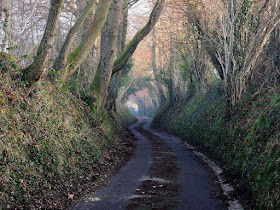Several days ago I started reading The Old Ways: A Journey on Foot, in which the author "sets off from his Cambridge home to follow the ancient tracks, holloways, drove roads and sea paths that form part of a vast network of routes that crisscross the British landscape..."
I added "holloway" to my list of words to look up. Then by coincidence I encountered a recent post by Miss Cellania on The Sunken Lanes of Europe, citing Amusing Planet, which has a gallery of photos (whence the embed).
Details at Wikipedia:
A sunken lane (also hollow way or holloway) is a road or track that is significantly lower than the land on either side, not formed by the (recent) engineering of a road cutting but possibly of much greater age.Fascinating, both visually and conceptually.
Various mechanisms have been proposed for how holloways may have been formed, including erosion by water or traffic; the digging of embankments to assist with the herding of livestock; and the digging of double banks to mark the boundaries of estates. These mechanisms are all possible and could apply in different cases.

'Hohlweg' is actually a not so uncommon German word, possibly partly due to a famous quote from Goethe's Wilhelm Tell play, 'Durch diese hohle Gasse muss er kommen.'
ReplyDeleteAlso at Atlas Obscura. Keeps reminding me of Sterling Holloway, the voice of Pooh.
ReplyDeleteAlso -
Deletehttps://en.wikipedia.org/wiki/Joan_Holloway
Not forgetting Cockney comic singer from the last century Stanley Holloway:
Deletehttps://www.youtube.com/watch?v=7zqdYl53fBk
There remain a few stretches of the Camino Frances to/from Santiago de Compostella which are dramatically lower than the surrounding woodland and you really get the feeling of walking in the footsteps of 1000 years of other pilgrims. Much of that ancient trackway is getting sanitised and made safe so that nobody is hurried to heaven . . . or even gets a turned ankle.
That is a wonderful book. You might be interested that a poster sized reproduction of the map that he discusses is available. As I recall, I ordered my through the Association of Petroleum Geologists in Tulsa. If you want information on this, I am sure I can find it.
ReplyDeleteI an aware of a holloway in the US, the Natchez Trace in Mississippi. https://www.nps.gov/natt/index.htm
ReplyDeleteNice photo at the link, Mark. Makes me want to hike there.
DeleteNot to mention the eponymous women's prison in London, now closed.
ReplyDeletehttp://www.capitalpunishmentuk.org/holloway.html
not a holloway, but out in the american west, you can still see the ruts left behind by the covered wagons as they made there way westward, ho!
ReplyDeleteI-)
That's discussed at the link.
Delete